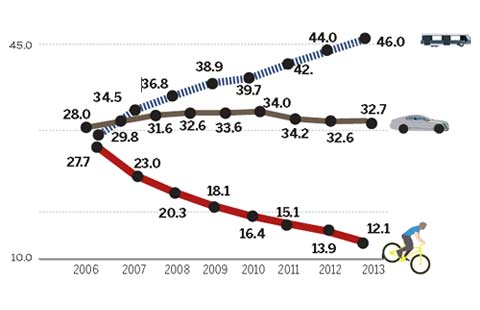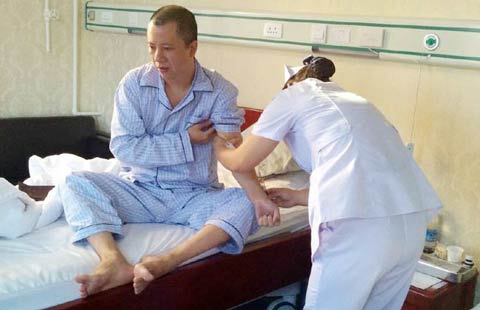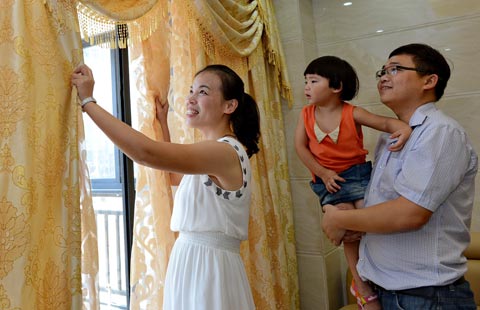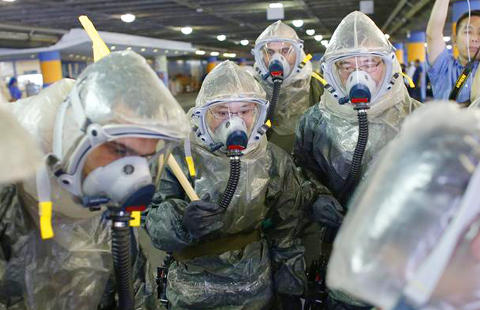Coordinating human rights development
Updated: 2014-09-18 07:38
By Cai Mingzhao(China Daily)
|
|||||||||||
China has actively taken part in international exchanges and cooperation on human rights.
China has been active in taking part in the UN's multilateral human rights meetings, participating in review and discussion concerning the subject of human rights. Since 2013, China has smoothly gone through the second universal periodic review of the UN Human Rights Council, and most countries attending the conference have sufficiently confirmed the progress that China had made in its cause of human rights, supporting China in promoting and protecting human rights in accordance to its own national situation. In 2013, China was elected a member state of the UN Human Rights Council from 2014-16 by huge votes. Now, China has dialogs and discussion about human rights with nearly 20 countries each year, improving the understanding between each other.
China's development and prosperity have not only brought better development to its own cause of human rights, but made contributions to the cause of human rights in the world.
According to statistics made by authoritative institutions, in 2013, China's contribution rate for world economic growth was nearly 30 percent, and China has become one of the major engines to push forward world economic growth. For recent years, China has taken various forms of assistance to support and assist other developing countries, especially the most underdeveloped countries in the fields of poverty reduction, grain security, trading development, crisis prevention and reconstruction, population development, women and children's healthcare, the prevention and control of diseases, education, environmental protection, and so on. This year, in the face of Ebola virus disease in western Africa, China has sent several groups of experts in public health to countries which suffer most, including Guinea, Liberia and Sierra Leone, and provided a large number of emergency humanity materials to help the local people preventing and controlling the plague. Since its first participation in the UN peacekeeping operations in 1990, China has taken part in 24 such activities of the UN, and dispatched more 25,000 person-time peacekeeping personnel in total. Hence, China has sent more engineering, transportation and medical units than any other countries which have sent troops for the UN peacekeeping operations, and also the developing country that pays more apportioned peacekeeping funds.
After exploration and efforts for years, China has successfully found a road of human rights development suitable to its own national situation. Summarizing the practice of human rights in China, we come to a few ideas as the following:
Firstly, the principle of universality of human rights should be combined with the particular situation of a certain country. The world develops multi-dimensionally, and there is no universal mode of human rights. The Vienna Declaration and Programme of Action passed by the world conference on human rights in 1993 points out, "the significance of national and regional particularities and various historical, cultural and religious backgrounds must be borne in mind." Likewise, ancient Chinese people said, "while oranges are grown south of the Huaihe River, they produce oranges, but when they are planted north of the river, they yield trifoliate oranges instead." Different people and countries have different understanding and requirements of human rights, and the problems that they face and need to solve first are not all the same, either. China is a large developing country with a population over 1.3 billion, the human rights development of China has been synchronous with its economic and social development all the time, and economic development and people's livelihood improvement have always been the crux of all the problems. That is the fundamental reason why China has taken the rights to existence and development as the primary human rights.
Secondly, the emphatic improvement and all-round development of human rights should be coordinated. It should be noted that no country can put into practice all human rights at the same. Human rights protection can be better performed only when people start with the national situation and reality of their own country to determine the emphasized items of human rights. China underwent heavy calamities and became weak due to poverty in modern times. It has been the greatest aspiration and pursuit of the Chinese people to shake off the backwards state and live a happy life. Therefore, China has always taken economic and social rights as a primary cut-in point for human rights protection, emphatically solving the problems of people's livelihood and benefits that are most direct and most practical, with which the masses are most concerned. It endeavors to enable each social member to live more happily with more respect. At the same time, China pays attention to view various human rights as an interdependent and indivisible organic whole, pushes forward the cause of human rights in a coordinated way together with economic construction, political construction, cultural construction, social construction and ecological civilization construction, boosts the harmonious development of economy, society, cultural rights, citizen rights and political rights, and improve the coordinated development of individual human rights and collective human rights.
Related Stories
Forum discusses the Chinese dream and human rights 2014-09-17 21:55
Human rights forum kicks off in Beijing 2014-09-17 17:55
DPRK releases human rights report 2014-09-13 18:48
5 more universities set up human rights centers 2014-07-23 07:35
Today's Top News
How Alibaba IPO learnt from Facebook's mistake
Russia to beef up troops in Crimea
10 problems of Chinese society
PBOC injects $81b into banks
iPhone 6 spawns Chinese satire
US general 'not rule out' larger ground role in Iraq
China's door to open wider, Li says
Shanghai FTZ official removed
Hot Topics
Lunar probe , China growth forecasts, Emission rules get tougher, China seen through 'colored lens', International board,
Editor's Picks

|

|

|

|

|

|





